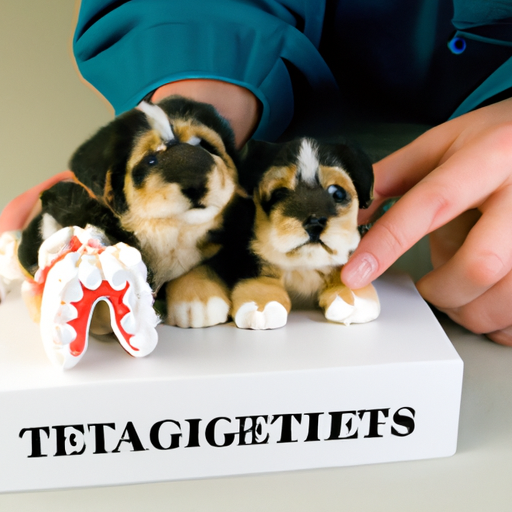Introduction
When you bring a new puppy home, there’s so much to learn and enjoy. One of the things you might not have considered is the process of teething. You’ve probably noticed those tiny, needle-like teeth that puppies love to nip with. Well, those are just their baby teeth, and like human babies, they will lose them. But how can you, as their caregiver, help them through this sometimes uncomfortable process? Let’s dive in and find out.
Understanding Puppy Teething
Puppies are born without teeth. Their first set, known as deciduous or baby teeth, start to come in when they’re about 3 to 6 weeks old. By the time they’re around 8 weeks old, most puppies have a full set of 28 baby teeth.
It’s important for you to understand that puppies will naturally lose these baby teeth. By the time they’re about 3 to 6 months old, the baby teeth will start to fall out to make room for their permanent teeth. This process can sometimes be uncomfortable for your puppy, and they may need some help to alleviate the discomfort.
Signs That Your Puppy Is Teething
As your puppy begins to teethe, you might notice a few signs. These can include:
- Increased chewing
- Drooling
- Changes in behavior (your puppy might seem more anxious or irritable)
- Loss of appetite
- Finding tiny teeth around your home
How to Help Your Puppy During Teething
Now that we understand what’s happening, let’s explore how you can help your puppy through this process.
Provide Appropriate Chew Toys
Puppies have a natural instinct to chew, especially when they’re teething. This helps to relieve the discomfort and helps the baby teeth to fall out. Make sure you provide plenty of safe, puppy-appropriate chew toys. These should be:
- Soft enough to not damage their gums
- Durable enough to not break apart and cause a choking hazard
- Sized appropriately for your puppy’s breed and size
Feed Soft Foods
During teething, your puppy’s gums may be sore. To help alleviate this, you can provide soft foods. This can include:
- Wet puppy food
- Soaking their dry food in water to soften it
- Homemade soft treats
Use Cold Treats
Just like a human child might enjoy a cold teether, your puppy might find relief in cold treats. You can try:
- Freezing a wet washcloth for them to chew on
- Providing frozen fruits or veggies (make sure they’re safe for dogs first!)
- Offering special puppy teething toys that can be frozen
Regularly Check Your Puppy’s Mouth
It’s a good idea to regularly check your puppy’s mouth during this time. This can help you spot any potential problems, like a baby tooth that hasn’t fallen out and is blocking a permanent tooth. If you notice anything unusual, don’t hesitate to reach out to your vet.
What Not to Do
While it’s important to know what to do, it’s equally important to know what not to do. Avoid the following:
- Don’t pull on your puppy’s baby teeth, even if they seem loose. This can cause pain and potentially damage the developing permanent tooth.
- Don’t give your puppy hard bones or chew toys. These can hurt their sensitive gums and damage baby teeth.
- Don’t ignore unusual behavior or signs of extreme discomfort. While some discomfort is normal, extreme discomfort or changes in behavior warrant a trip to the vet.
FAQ
Q: How long does puppy teething last?
A: Typically, teething can last between 3 to 6 months. However, this can vary depending on the breed and individual dog.
Q: Can I brush my puppy’s teeth while they’re teething?
A: Yes, but be gentle. Use a soft-bristled puppy toothbrush and special dog toothpaste.
Q: Is it normal for a puppy to bleed when they lose a tooth?
A: A little bit of blood is normal, but if you notice excessive bleeding, contact your vet.
Q: What should I do if a baby tooth doesn’t fall out?
A: If a baby tooth doesn’t fall out and you can see the permanent tooth coming in, contact your vet. They may need to remove the baby tooth.
Q: Can teething cause my puppy to be less active?
A: Yes, your puppy might be less active if they’re uncomfortable. However, if this continues for more than a day or two, it’s best to contact your vet.
Teething is a normal part of puppyhood, and with your help and a little patience, your puppy will soon have a healthy set of adult teeth. Just remember, every puppy is different, and what works for one might not work for another. Always consult with your vet if you have any concerns.



